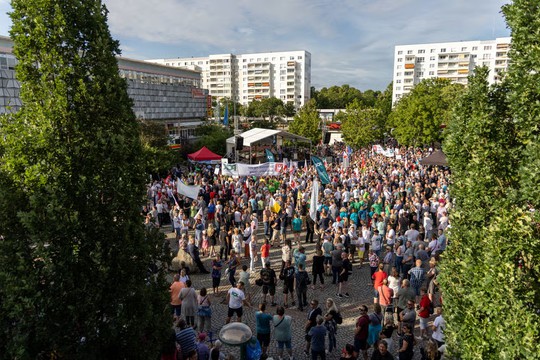Protesters, including workers from the German oil refinery, demand an end to the embargo of Russian oil imports.
Photo: Getty Images
Shortly after Russian troops marched toward Kyiv, the EU slapped sanctions on Moscow’s key economic lifeline, fossil fuels.
Three years later, the continent has nearly unwound its own long-held reliance on Russian energy. Gas pipeline imports are down by two-thirds, and oil and coal shipments by sea are banned, POLITICO admits.
The returning president’s vow to end the fighting has given oxygen to EU voices arguing that a ceasefire could presage a return to Russian energy. Europe’s economic stagnation, and gas and power prices still at double prewar levels, are adding still more fuel to that fire.
The bloc’s far-right forces, from Austria’s Freedom Party to Bulgaria’s Revival, have long called for restarting supplies from Moscow. But now mainstream politicians, including Italy’s energy minister and officials from Germany’s ruling center-right, are also refusing to rule it out.
Europe’s energy sector is keen, too. In France alone, energy firms TotalEnergies and Engie have said Europe could eventually up Russian gas buys by 40 percent.
In Germany — the nucleus of Europe’s economic slump — the debate is crescendoing. Politicians from both the ruling Social Democrats and Christian Democrats have debated reviving the Russia-to-Germany Nord Stream pipelines, which were destroyed in 2022, although Friedrich Merz is now pushing to sanction the subsea links.
A spokesperson for Germany’s economy ministry said the country had “set itself the goal of becoming independent of Russian oil as quickly as possible — and has successfully achieved this.”
But “pressure will definitely grow,” said Stefan Meister of the German Council on Foreign Relations, as “more voices from different companies, but also from politicians on the local level… demand returning to cheap Russian oil and gas.”
Merz: “Nord Stream 2 cannot be put back into operation”
So far, mainstream politicians have stayed resolute on ending Russian imports.
Germany’s Merz in May vowed to ensure “that Nord Stream 2 cannot be put back into operation,” even backing fresh EU sanctions on the pipelines for good measure.
The EU, too, is steaming ahead with plans to quit Russian supplies. Brussels last month proposed legislation to fully phase out Moscow’s gas imports by 2027.
“It’s quite clear that we have already learned the lesson that dependency on energy imports from Russia is not without a price,” Lithuanian Energy Minister Žygimantas Vaičiūnas told POLITICO. “So sooner or later, we are paying the price for that.”
“We’re not going back,” echoed one EU official, speaking anonymously to discuss the sensitive subject. Even a ceasefire in Ukraine is not equivalent to a “long-term peace,” the official added.
But achieving that is far from a given. There’s legal uncertainty about Brussels’ gas-quitting legislation, while countries such as Austria, Slovakia and Hungary want to leave the door open for Russian imports. At the same time, Budapest and Bratislava are constantly threatening to tank the EU’s Russia sanctions in retaliation.
Additionally, an EU offer in 2022 to spend €2 billion on helping plants pivot away from Russian energy has come to little, at least in the bloc’s most heavily dependent countries of Slovakia and Hungary.
The Trump card
More powerful than those internal pressures is an external force: Trump.
Despite his campaign pledge to end the bloodshed in Ukraine in “24 hours,” the U.S. president has struggled to make progress on a ceasefire. The former reality show star has wavered on further sanctions against Moscow, while heaping praise on the Russian leader and persistently backing closer economic ties with the Kremlin.
“Russia wants to do largescale TRADE with the United States when this catastrophic ‘bloodbath’ is over, and I agree,” Trump wrote after a two-hour call with Putin in May.
That debate is also firing up his administration. While White House special envoy Steve Witkoff wants to lift energy sanctions on Russia, according to two people familiar with the matter, Interior Secretary Doug Burgum would rather displace Moscow to make room for more U.S. imports.
In any case, Europe’s energy sector is at the heart of that potential cooperation. Moscow is in talks with Washington over restarting Nord Stream, backed by U.S. investors.
That’s sparking anxiety in Brussels. Trump and Putin “want to divide the European energy market and create [separate] spheres of influence,” said a second EU official, also granted anonymity.
read more in our Telegram-channel https://t.me/The_International_Affairs

 10:11 06.07.2025 •
10:11 06.07.2025 •























